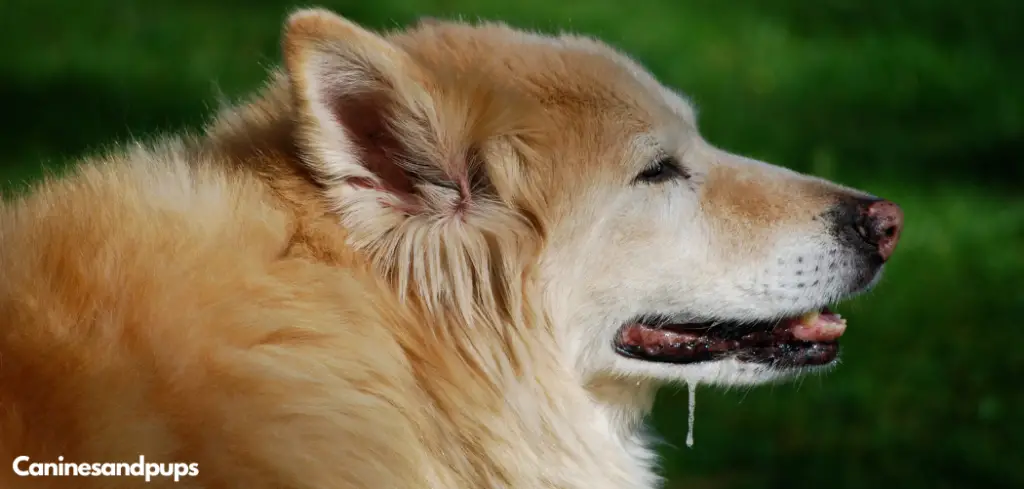If your dog is drooling not eating or drinking, it’s a serious red flag. Unlike occasional food refusal or mild stomach upset, a dog that won’t eat or drink and is drooling excessively may be in pain, nauseous, or suffering from a more severe medical condition.
Hydration is vital for dogs, so when both food and water are refused, it’s critical to act quickly.
We outline what might cause your dog to drool and avoid both food and water, what you can do in the moment, and when it’s time to see the vet urgently.
Dog Drooling Not Eating or Drinking: Why It Happens
When your dog is drooling, not eating or drinking, this set of symptoms can stem from dental abscesses, oral injuries, gastrointestinal blockages, poisoning, or serious systemic illness.
When your dog is drooling not eating or drinking, it usually indicates discomfort so severe that even water feels unbearable.
This could signal a foreign object in the mouth, extreme nausea, toxin ingestion, or an underlying condition like kidney failure or infection.
Prompt evaluation is necessary to prevent complications from dehydration or worsening illness.

Dog Drooling Not Eating or Drinking: Common Causes
Severe Dental Disease or Mouth Trauma
Painful dental conditions can make both eating and drinking intolerable.
A dog with an advanced tooth abscess, gum infection, or fractured jaw might drool heavily and avoid putting anything in their mouth—food, water, or even toys.
Look for swelling on the face, bleeding gums, or a foul odor. In some cases, the dog may paw at the mouth or avoid being touched around the head.
Immediate dental care is often necessary to address infection and relieve pain.
Foreign Object or Obstruction in the Mouth
If your dog suddenly starts drooling and avoids food and water altogether, it’s possible something is stuck in their mouth or throat.
This could be a bone shard, stick, piece of string, or even part of a toy. Obstructions may cause drooling, gagging, and reluctance to swallow.
Avoid reaching into the mouth unless you can clearly see and easily remove the object.
Pushing it further back can be dangerous. If your dog is in distress or choking, seek emergency veterinary assistance right away.
Related: Dog drooling and not eating (Causes and when to worry)
Toxin Ingestion
Toxic substances can irritate the mouth, stomach, or internal organs, leading to immediate symptoms such as drooling, vomiting, and refusal to eat or drink.
Common household toxins include medications, antifreeze, pesticides, or plants like lilies or sago palm.
Your dog may show signs like tremors, disorientation, or collapsed posture if poisoning is advanced.
This is a veterinary emergency. Bring any packaging or information about what they might have ingested to help guide treatment.
Nausea from Gastrointestinal Issues
In cases of severe nausea, dogs may not only refuse food but also stop drinking. This might occur due to pancreatitis, intestinal inflammation, or a gastric blockage.
You might notice additional symptoms such as lip licking, restlessness, or vomiting bile or foam.
While mild nausea might resolve with rest and fasting, dehydration from refusing both food and water can happen quickly. If your dog skips more than one meal and won’t drink, it’s time for a medical checkup.
Fever or Systemic Infection
Infections from viruses, tick-borne diseases, or internal inflammation can cause a dog to drool, feel weak, and refuse both food and water.
Fever or pain can leave your dog lethargic, withdrawn, and completely disinterested in eating or drinking.
This type of illness usually requires diagnostic testing—such as bloodwork or imaging—to identify the root cause.
IV fluids and medication may be necessary, especially if dehydration has already set in.
What to Do if Your Dog Is Drooling Not Eating or Drinking
If your dog is showing these symptoms, take action immediately with these steps:
Inspect their mouth gently, checking for stuck objects, sores, or visible trauma.
Offer cool, clean water using a small syringe (without force) to encourage hydration.
Avoid food altogether until your vet can rule out causes like a blockage or oral injury.
Do not give human medications—many are toxic to dogs, even in small amounts.
Keep your dog calm and in a quiet place to reduce anxiety or stress-based causes.
Because dehydration can develop quickly, especially in small or senior dogs, don’t wait more than 12–24 hours to seek veterinary help.
When to Call or Visit Your Vet
Call your vet urgently if:
Your dog has not eaten or drank anything in over 12–24 hours.
They are drooling excessively and showing signs of pain or restlessness.
You suspect your dog ingested something harmful.
There’s vomiting, diarrhea, or signs of dehydration (sunken eyes, dry gums).
You observe a visible injury, swelling, or foreign object.
Time is critical when your dog stops drinking—dehydration affects organ function quickly and can lead to shock or death if left untreated.
Related: Dog drooling and not eating but drinking water (Should you worry?)
Key Takeaway
A dog that’s drooling but not eating or drinking is in distress—and possibly danger.
Whether caused by dental pain, nausea, or a toxin, these symptoms shouldn’t be brushed off.
Hydration is essential for life, and even a few hours without water can start to affect your dog’s well-being. When in doubt, don’t hesitate to call your vet.
You know your dog best. When their behavior shifts suddenly, your quick action can make all the difference in helping them recover and feel like themselves again.
